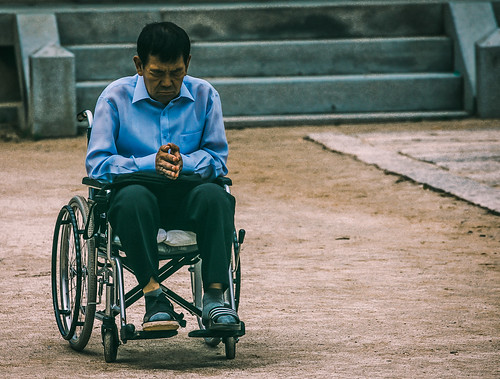 |
| Photo Credit: avidaebella |
Tired in the Tension: My Reflections on Today’s March (Yo Soy Kristy)
"I live in two very different worlds. I live in a world where friends who follow Jesus saw their march today as a living out of gospel values in both word and deed, even if they disagreed with parts of the platform as Christian women and men. I also live in a world where, to other friends, it was unfathomable that any true follower of Jesus would march next to anyone who thought killing babies was okay. To them, it was a politically liberal march with a liberal agenda. It was a bunch of angry women wearing pink hats yelling about vaginas. That’s it."The Lonely Path of Racial Reconciliation for Minorities by Jarvis Williams (RAAN)
In this article, Dr. Williams highlights some of the very real challenges that ethnic minority Christians face when seeking to reach across racial and cultural lines.
3 Ways Some Churches Grow Without Getting Bigger by Karl Vaters (Christianity Today)
"In many developing nations, large churches don’t fit the culture or meet the needs of the people. So, instead of getting bigger, church growth means planting new congregations in nearby neighborhoods or villages. In fact, in the places where the church is growing as percentage of the population, it is far more likely to be happening by the multiplication of smaller congregations than by the building of larger ones. Growth by multiplication is the way it’s done for many within the house church movement, too. If the gathering gets large, they split off to new houses. This type of growth is not limited to developing nations and house churches. If your church hasn’t been seeing the kind of "butts-in-the-seats" growth you’ve expected, this may be a new way for you to look at growth."Set of 30 Bible Stories about Honor & Shame (HonorShame)
For those of us that have grown up in the Western World, we can tend to look at our faith and relationship with God through more of a "guilt/innocence" mindset. For many that come from a more Eastern cultural background, though, an "honor/shame" framework might be more dominant. Here is a list of a number Bible stories that can be viewed through the honor/shame lens.
Reflecting on T4G’s “The Future of the Asian American Church by Andrew Ong (Reformed Margins)
"I understand that the specific question, “Are ethnic churches legitimate and biblically faithful in multiethnic contexts?” was not posed. However, wasn’t that what most of us were hoping to hear discussed? I felt like that question was skirted. Yes, Dr. Jue helpfully laid out why the Asian American church has value and what it could do for the sake of mission. However, all these things could easily applied to Asian American Christians individuals. Why do we specifically need Chinese and/or Korean churches? Ecclesiology was sorely lacking from the discussion. What does it mean for “the church” to be multiethnic? Are we talking about local churches, the universal church, or somehow both? And if both, how should that shape our discussions concerning multi-ethnicity and the church?"How the Nazis Took Control of Germany by Peter Hayes (The Daily Beast)
"The key to understanding the transformation of Germans’ behavior is straightforward: power magnifies the ideas of those who hold it. Power enabled the Nazi regime to unleash the haters, to intimidate the squeamish, and to change the moral valence of prejudice from something frowned upon to something glorified as patriotic. Once that happened, individual self-interest took care of the rest. Above all, power enabled the propagandists for Nazism to divide the world relentlessly into Us vs. Them and to shut down more nuanced perspectives. To Germans, the world became a perpetual struggle between poor, virtuous, and victimized Us, and malevolent, conspiratorial, and implacable Them. In such an unforgiving environment, all means of self-defense were justified, including preemptively striking Them—taking their rights away, concentrating them in camps and ghettos, wiping them out—before they supposedly had a chance to do their worst."



